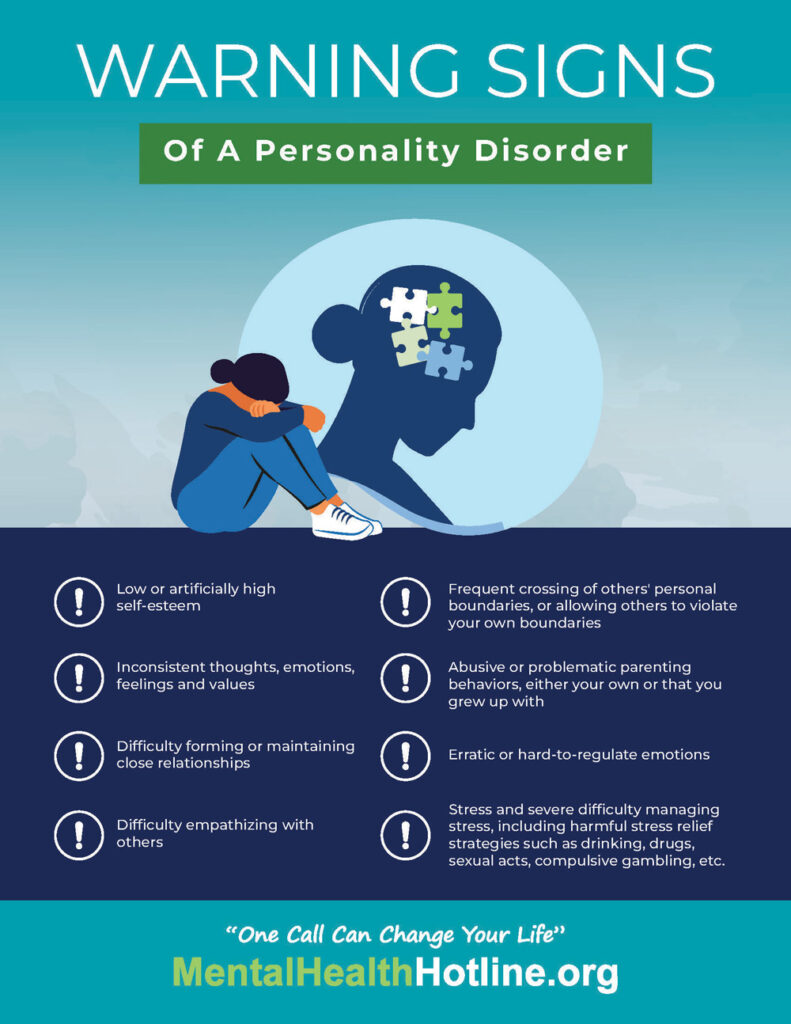If you had a personality disorder, would you know it? More importantly, would you know how to manage it?
The term “personality disorder” might feel like a burden or an embarrassment, but it’s nothing to be ashamed or afraid of. About 9% of American adults have some kind of personality disorder, and plenty of folks have more than one.
If a problem with your personality is affecting how you live, it’s important to face the problem and deal with it openly and honestly. Let’s talk about how you can do that.

Recognizing the Signs: Common Symptoms of Personality Disorders
There are a lot of behavioral health issues out there, and identifying personality disorders can be complicated. For one, it may have a big impact on how you think about yourself. Certain disorders can even keep you from recognizing you have them.
Thankfully, there are several warning signs to most personality disorders you can use to identify a problem. None of these are a diagnosis in themselves, but they can be a good tool for knowing when you should reach out to a mental health professional.
Warning signs of a personality disorder include:
- Low or artificially high self-esteem
- Inconsistent thoughts, emotions, feelings and values
- Difficulty forming or maintaining close relationships
- Difficulty empathizing with others
- Frequent crossing of others’ personal boundaries, or allowing others to violate your own boundaries
- Abusive or problematic parenting behaviors, either your own or that you grew up with
- Erratic or hard-to-regulate emotions
- Stress and severe difficulty managing stress, including harmful stress relief strategies such as drinking, drugs, sexual acts, compulsive gambling, etc.
Self-Assessment: Reflecting on Your Thoughts and Behaviors
It can be a challenge to honestly reflect on having a personality disorder. Even in the best of times, it’s loaded with emotional baggage and big life changes that can include broken friendships, divorce, difficult relationships and self-abuse. It takes integrity and courage to assess yourself in this way, which puts you way ahead of the game. A lot of people with personality disorders never bring themselves to face the issues that make life hard for them.
How you choose to assess yourself depends on your own values and practices. If you’re religious, a spiritual leader can be a great resource to talk to. If you have a friend you trust to tell you the unvarnished truth, they can be a valuable outside perspective and a reality check for your behavior. If you prefer to privately reflect, meditate, write yourself a letter or critically review the decisions you’ve made in your life, all of these can be a valid route to self-awareness.
However you’re reflecting on your personality and potential issues, it’s important to strike a balance between being understanding and being honest. If you’re in the habit of hurting people you love, it can be hard to admit your own role in the problem. But it’s also important not to overstate your control over events and relationships. Try to walk the line between blaming yourself for everything and evading accountability for your choices.
Seeking Professional Evaluation: The Role of Mental Health Experts
If you come to believe you might have a personality disorder, there’s no downside to asking a mental health professional for input. Properly trained psychiatrists, psychologists, LCSWs and other therapists see plenty of personality disorders in their work, and they’re trained to give you an informed, objective assessment of how you’re doing. Only a professional can properly diagnose a personality disorder.
Understanding Different Types of Personality Disorders
So, what is a personality disorder? These disorders are loosely grouped into clusters A, B and C. Here’s a quick list:
- Narcissistic personality disorder
- Histrionic personality disorder
- Borderline personality disorder
- Schizoid personality disorder
- Obsessive-compulsive personality disorder
- Dependent personality disorder
- Paranoid personality disorder
- Schizotypal personality disorder
Group A Personality Disorders
Group A disorders are marked by irrational and unrealistic thinking, which often motivates odd or unpredictable behavior. Conditions in this group include paranoid, schizoid and schizotypal personality disorders.
Group B Personality Disorders
Group B disorders are marked by dramatic, highly emotional and unpredictable behavior. People with these disorders frequently burn through relationships with toxic words and actions. Disorders in this group include borderline, antisocial, narcissistic and histrionic personality disorders.
Group C Personality Disorders
Group C disorders are marked by anxiety and dysfunctional thinking or actions. People with a Group C disorder can have trouble interacting normally for fear of alienating or displeasing others. This category includes avoidant personality disorder, obsessive-compulsive personality disorder and dependent personality disorder.
Steps Toward Diagnosis and Treatment: Next Best Actions
If you’ve read this far and recognize yourself in any of the descriptions above, that’s good news. You’re practicing self-awareness and the willingness to face a major issue in your life — the next step is reaching out for help.
The professionals at the Mental Health Helpline are always here to help you find resources in your area. Call us today for a free, confidential consultation.